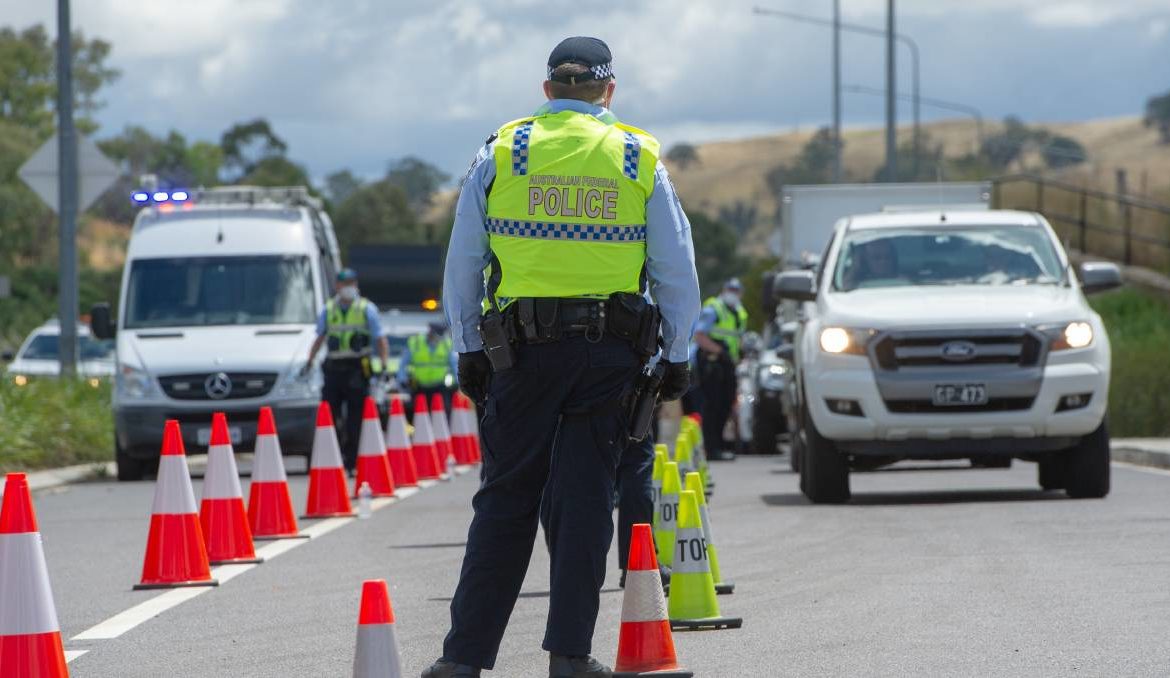coronavirus, act policing, federal highway, kerryn coleman, avalon cluster
Territory police are continuing their border crackdown on non-residents as the ACT enters its second day of border closures with COVID-19 hotspots in New South Wales. The ACT government announced on Saturday it would be effectively closing its borders to non-residents who had been in COVID-19 hotspots and requiring residents returning to enter a 14-day quarantine. ACT Policing confirmed 1739 vehicles had been stopped on Saturday with 135 vehicles turned away from entering. ACT residents returning from the identified areas were among those checked with 119 being directed to quarantine. Operations would continue on Sunday on the Federal Highway near the border, police said. “ACT Policing will continue to patrol highways and roads into Canberra, and will increase its activities at certain times of the day,” an ACT Policing spokesperson said. Police would not provide reasoning regarding why similar checkpoints were also not being set up on alternative highways leading into the territory or how they were verifying compliance outside of the border checks. The checkpoints caused confusion and frustration for many as queues along the major highway stretched on for kilometres. One resident, Simone Maher, visited Lerida Estate to celebrate a birthday lunch with friends on Saturday. On her return, she was caught in a long line of cars waiting to enter the territory, making the typically 30-minute journey into a three-hour one. “We were not aware we would be stopped by [a] checkpoint coming home,” Ms Maher said. The stoppage started around 1.5 kilometres out from Eagle Hawk Park, Ms Maher said. Once she made it to the police checkpoint by 5.30pm, her licence was checked and a few questions asked and she was allowed to pass through. READ MORE: ACT chief health officer Kerryn Coleman said the tighter restrictions introduced on Saturday were necessary to protect the ACT community. “In recent days we have continued to see around 80 non-ACT residents from COVID-19 affected areas travel to the ACT daily,” Dr Coleman said. “As a result we now have around 2000 people in quarantine in the ACT, 25 per cent of which are non-ACT residents. “We are putting in place strengthened travel restrictions to make it absolutely clear to non-ACT residents who live or have recently visited COVID-19 affected areas of NSW that they are not able to be in the ACT at this time.” Anyone caught breaking the new rules can be fined up to $8000, acting Health Minister Chris Steel said.
/images/transform/v1/crop/frm/fdcx/doc7dri21wo36vnmqrlogc.jpg/r9_183_3901_2382_w1200_h678_fmax.jpg
Territory police are continuing their border crackdown on non-residents as the ACT enters its second day of border closures with COVID-19 hotspots in New South Wales.
The ACT government announced on Saturday it would be effectively closing its borders to non-residents who had been in COVID-19 hotspots and requiring residents returning to enter a 14-day quarantine.
ACT Policing confirmed 1739 vehicles had been stopped on Saturday with 135 vehicles turned away from entering. ACT residents returning from the identified areas were among those checked with 119 being directed to quarantine.
Operations would continue on Sunday on the Federal Highway near the border, police said.
“ACT Policing will continue to patrol highways and roads into Canberra, and will increase its activities at certain times of the day,” an ACT Policing spokesperson said.
Police would not provide reasoning regarding why similar checkpoints were also not being set up on alternative highways leading into the territory or how they were verifying compliance outside of the border checks.
The checkpoints caused confusion and frustration for many as queues along the major highway stretched on for kilometres.
One resident, Simone Maher, visited Lerida Estate to celebrate a birthday lunch with friends on Saturday. On her return, she was caught in a long line of cars waiting to enter the territory, making the typically 30-minute journey into a three-hour one.
“We were not aware we would be stopped by [a] checkpoint coming home,” Ms Maher said.
The stoppage started around 1.5 kilometres out from Eagle Hawk Park, Ms Maher said. Once she made it to the police checkpoint by 5.30pm, her licence was checked and a few questions asked and she was allowed to pass through.
ACT chief health officer Kerryn Coleman said the tighter restrictions introduced on Saturday were necessary to protect the ACT community.
“In recent days we have continued to see around 80 non-ACT residents from COVID-19 affected areas travel to the ACT daily,” Dr Coleman said.
“As a result we now have around 2000 people in quarantine in the ACT, 25 per cent of which are non-ACT residents.
“We are putting in place strengthened travel restrictions to make it absolutely clear to non-ACT residents who live or have recently visited COVID-19 affected areas of NSW that they are not able to be in the ACT at this time.”
Anyone caught breaking the new rules can be fined up to $8000, acting Health Minister Chris Steel said.







